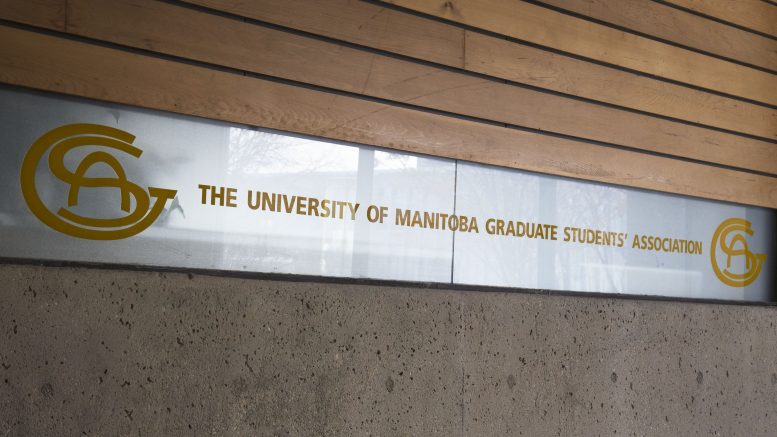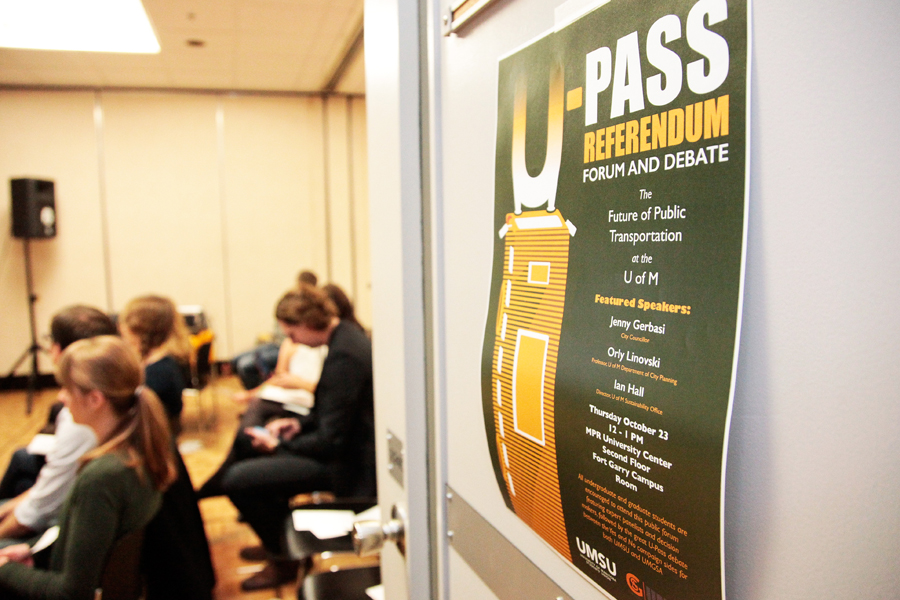The University of Manitoba Graduate Students’ Association’s (UMGSA) annual general meeting, which took place on the evening of Jan. 21, saw a surprisingly high showing of graduate students. UMGSA president Kristjan Mann pointed out it was one of the largest he had ever seen.
The meeting is where proposed changes to bylaws, membership policies, and election procedures can be approved or disproved. Members also have an opportunity to learn about the progress of various committees and the financial status of the association.
UMGSA vice-president internal Valery Agbor, who chairs both the finance and bylaws committees, reported on the finances of the organization, noting that, of the proposed budget of $400,000, approximately $153,000 remained for the 2015-2016 term. Agbor said that while the association saved money in some areas, such as orientation expenses due to partnerships with the Office of Student Life, they “went over on the budget” in others.
The UMGSA had awarded 268 conference and travel grants by December 2015, totalling $125,710.09 of the approximately $177,200 budget. One of the UMGSA’s main functions is supporting graduate students through these grants and the increase in the grants’ budget and expenditure each year is reflective of the high demand and need for graduate student funding. The GSA also gives out awards to two full-time masters and PhD applicants and two part-time graduate applicants, based on research, academic experience, community involvement, and professional excellence. Overall, Agbor reported that the finance committee had “done its job” in accordance with the association’s spending policy.
In his report, Mann reflected on the association’s stronger role in the GU15, which involved hosting delegates from all over Canada for the semi-annual conference held at the University of Manitoba last August. The national organization provides a venue for student leaders to discuss pertinent issues including funding, childcare, mental health, and time to completion, among others. Mann said that the UMGSA received a very positive response and student leaders from other universities were “impressed with what [we] had to offer.”
The GU15 will continue to be a priority for the UMGSA campaigns committee as they prepare for the next conference at the University of British Columbia. Enoch A-iyeh, vice-president external and chair of the campaigns committee, said that a letter requesting greater assistance for graduate students from the provincial government was drafted and circulated to members of the GU15 for support. A-iyeh said that, in light of budget cuts and increasing international student tuition, it is important to let the provincial government know that “this is not OK and it’s important that you hear [us].” The anti-cuts campaign will also continue to be a priority as the university prepares to cut another four per cent from its operating budget.
The major motion of the evening was a proposed 11-per cent increase to the president’s honorarium and a 22.5-per cent increase to the vice-presidents’ honoraria. The president and vice presidents are paid $13,800 and $9,300, respectively. The proposed motion suggested that executive honoraria be increased to $15,500 for the president and $12,000 for the vice presidents.
The UMGSA bylaws stipulate that executive honoraria must be reviewed by the internal development and review sub-committee (IDRSC). The IDRSC, chaired by Carl Neumann, was charged with researching and compiling comparative data on the honoraria received by graduate student organization executives at other universities. The IDRSC’s recommendations also took online discussions and feedback into consideration.
Neumann reported that graduate organizations differ vastly in how they remunerate executives. However, these were not the only criteria involved in proposing the increase. The UMGSA executives’ relatively great workload and lack of supporting staff was cited, as well. Discussion on the motion by members included calls to re-review the figures, a more proportional increase across the board for all executives, and hiring more staff to reduce the burden on executives.
It was also suggested that staff be hired in lieu of non-essential executive positions, and for the purposes of continuity. Executive-at-large Richard From, who also chaired the meeting, informed the membership that a new staff position has been created. After much lively discussion, the membership voted overwhelmingly for the motion, which will take effect in the 2016-17 term.
The meeting concluded with a review of the UMGSA’s relationship with the Canadian Federation of Students (CFS) by Mann. This discussion was conducted in private session with the membership.
Since a 2012 report unearthed questions over the manner in which the UMGSA joined CFS in 2001, the UMGSA has maintained that it is not a member of CFS, going so far as to enshrine their non-membership in their bylaws. UMGSA membership voted in their 2012 annual general meeting to hold the associated fees in a contingency fund until the end of the 2017-18 term.
The CFS has ongoing membership disputes with a number of student unions. Last year, following a legal battle, the Cape Breton University Students’ Union was ordered to pay CFS $295,000 in outstanding fees along with $100,000 in court costs.
Correction: The print version of this article incorrectly states that Richard From is a senator for the UMGSA. He is actually the executive-at-large. We apologize for the error.
This article was originally published in the Gradzette.



